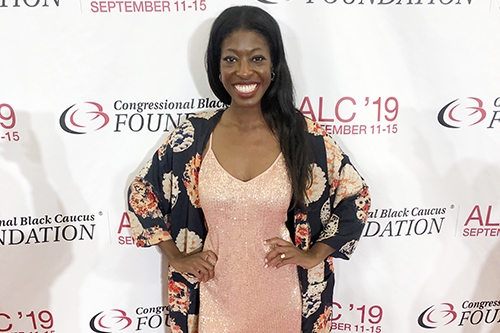Ewo Harrell ’10 is a manager of the Partnership for Healthy Cities at Vital Strategies, a global health organization that believes every person should be protected by a strong public health system. Supported by Bloomberg Philanthropies in conjunction with the World Health Organization (WHO) and Vital Strategies, the Partnership is a global network of 70 cities. It is committed to saving lives by preventing non-communicable diseases like heart disease, diabetes, chronic lung disease and cancer, and injuries. The Partnership recently expanded and activated its network to respond to COVID-19.
Q: How have your responsibilities at the Partnership been impacted by COVID-19? How has the pandemic changed what you do?
Cities have a long history of coping with public health emergencies. Now they’re at the frontlines of the pandemic. COVID-19 has the potential to spread quickly in urban centers and many of those at risk for severe illness are those with underlying conditions, including non-communicable diseases like diabetes and cancer. During this evolving crisis, our team has shifted and expanded its scope of work – from a focus on preventing non-communicable disease and injuries to immediate assistance in the urban response to COVID-19. I manage interactions and coordinate with 12 city government technical leads in North America, South America, Europe and Australia to implement high-impact, evidence-based policy interventions.
The Partnership is helping cities respond in several ways, one of which includes a new online platform. It provides city leaders with important tools and technical resources, everything from maintaining public services to legal guidance on implementing public health measures. The Partnership also held its inaugural Bloomberg Philanthropies Partnership for Healthy Cities COVID-19 webinar series for mayors. The series provided city leaders with guidance on how to implement best-practice COVID-19 interventions, and was a virtual venue for sharing COVID-19 experiences and strategies.
Q: Previously, you worked in the office of Congressman Joe Neguse (D-Colo.). What was your title and what did your job entail?
I had the privilege to work in the district office for Congressman Joe Neguse (CO-02) as a constituent advocate. Most of my work focused on public health and providing technical assistance to constituents as it relates to healthcare policy and benefits from the state or federal government. When COVID-19 was declared a pandemic, the focus remained the same – to serve constituents. Messages and calls from constituents increased ten-fold, with most seeking answers on how to protect themselves and their families. My priority became answering those questions and sharing them with our legislative team to inform policies. In that period the congressman introduced bills to protect families, small business owners, frontline healthcare workers and more.
Q: As a public health professional, what are you learning from this situation about effective (or ineffective) public health policies?
The COVID-19 response has highlighted the need for effective communication and consensus in public health policies. It is important to effectively communicate the research and provide clear and consistent direction, even when faced with new and changing information. This helps build trust with individuals and communities.
Q: From your perspective, what’s the best way through this pandemic?
People should wear masks in public, wash hands and practice physical distancing to protect themselves and others. When I worked for Congressman Neguse, I spoke to many concerned constituents who called our office and asked, “What can I do to help?” My answer was to listen to the experts who have suggested that the best way through this pandemic is to work collectively to prevent further COVID-19 spread.
